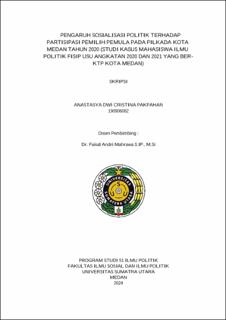| dc.contributor.advisor | Mahrawa, Faisal Andri | |
| dc.contributor.author | Pakpahan, Anastasya Dwi Cristina | |
| dc.date.accessioned | 2024-12-04T07:15:25Z | |
| dc.date.available | 2024-12-04T07:15:25Z | |
| dc.date.issued | 2024 | |
| dc.identifier.uri | https://repositori.usu.ac.id/handle/123456789/99141 | |
| dc.description.abstract | This thesis is motivated by the results of the recapitulation of the number of votes, the level of participation in the Medan City regional elections in 2020 was 46%. Even though this result has increased from the previous regional election which was only 25% in 2015, the result of 46% is still very far from the national target that has been set, namely 77.5%. The aim of political outreach is to convey information about the election stages, program and election schedule. The type of data used in this research is quantitative research. The data collected is mostly in the form of numbers. This research is supported by conventional and non- conventional participation theories (Gabriel A. Almond), and is formulated into assessment indicators for each Political Socialization variable (X) and Political Participation variable (Y).
The research results show that there is a relationship between the two variables, namely the independent variable (independent variable), namely political socialization, and the dependent variable (dependent variable), namely the political participation of novice voters. The relationship between these two variables is positive and strong, because the correlation between the two is 0.770. So the relationship between the two variables political socialization and political participation is unidirectional. It can be interpreted that if the political socialization variable is increased, the political participation variable will be higher. The correlation between the two variables in this study is 0.593. Based on the output results using SPSS 25.0, there is a 59.3% coefficient of determination, which means that there is a 59.3% influence of political socialization on the political participation of novice voters in the 2020 Medan City regional elections, while another 40.7% is another factor that not included in this research. | en_US |
| dc.language.iso | id | en_US |
| dc.publisher | Universitas Sumatera Utara | en_US |
| dc.subject | Political Socialization | en_US |
| dc.subject | Political Participation | en_US |
| dc.subject | New Voters | en_US |
| dc.title | Pengaruh Sosialisasi Politik terhadap Partisipasi Pemilih Pemula pada Pilkada Kota Medan Tahun 2020 (Studi Kasus Mahasiswa Ilmu Politik FISIP USU Angkatan 2020 dan 2021 yang Ber- KTP Kota Medan) | en_US |
| dc.title.alternative | The Influence of Political Socialization on the Participation of Beginner Voter in the 2020 Medan City Elections (Case Study of 2020 and 2021 Political Science FISIP USU Students with Medan City KTP) | en_US |
| dc.type | Thesis | en_US |
| dc.identifier.nim | NIM190906062 | |
| dc.identifier.nidn | NIDN0022127504 | |
| dc.identifier.kodeprodi | KODEPRODI67201#Ilmu Politik | |
| dc.description.pages | 130 Pages | en_US |
| dc.description.type | Skripsi Sarjana | en_US |
| dc.subject.sdgs | SDGs 17. Partnerships For The Goals | en_US |


